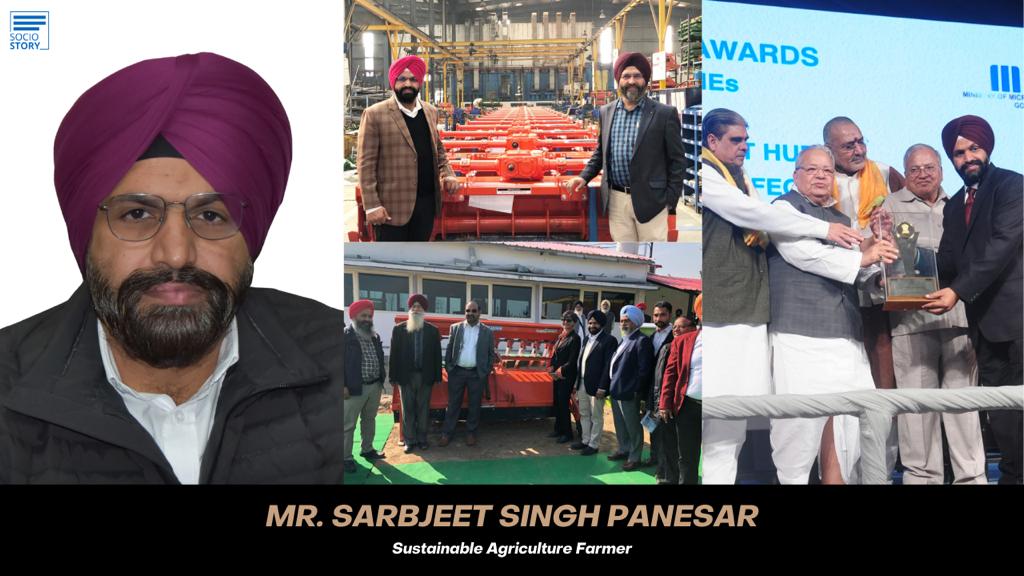Adopting sustainable practices in agriculture will go a long way in conserving resources
June 1, 2022, 7:16 p.m.

By: Reshma Jain
Sarbjeet Singh’s father had a small-scale agricultural implements manufacturing unit for serving the nearby farmers. After his education, Singh joined his family-based company Dasmesh Mechanical Works, Amargarh which was into making a few agricultural implements.
In his earlier years with the company, Singh introduced a couple of new products such as Rotary Tiller, Happy Seeder, and Roto Seeder, and expanded the sales network. He initiated the investment in Research & Development and manufacturing machinery to make the best quality products.
In the year 2007, John Deere India chose Dasmesh as their preferred partner for Rotary Tiller. Later, they had a tie-up with New Holland for agricultural implements. Considering the future business opportunities in emerging India, he built a world-class manufacturing facility, 3 km away from the Amargarh plant. In the year 2009, he formed a 100% subsidiary company Ishwar Farmline to make crop harvesting equipment.
From childhood, Singh witnessed hard working farmers, abundant water, and fertile alluvial soils in and around him. But, the cropping pattern of wheat and paddy rotation had led to a manifold increase in the usage of irrigation water. Injudicious surface water irrigation policies, indiscriminate/excessive groundwater pumpage due to free electricity coupled with irrational irrigation and agricultural practices have led to situations wherein fresh groundwater resources of the state have depleted at an alarming rate in most parts of the state. During the onset of winter, farmers burnt paddy straw due to (i) lack of suitable machinery for combine-harvested rice residue management (heavy and loose straw) (ii) no usage of straw, and (iii) short span available for wheat sowing.
Burning of straw resulted in severe consequences for the environment as it led to soil deterioration, soil nutrients, pH level, moisture, available phosphorus, soil organic matter, and microbial population was adversely influenced by burning. This led to threefold problems: soil health deterioration, water shortage, and air pollution causing many health issues and subsequent deaths of thousands of people. This inspired Singh to make products that can address these problems and help society and the environment for the future generation.
“It started while building the Landforce World Class Manufacturing plant at Langrian, just 3 km away from the first Amargarh Plant. It aimed to design a huge green landscape, plantation around the boundary, a water harvesting system, energy-efficient machinery, and a paint booth which were installed in the new plant to manufacture several agricultural implements,” shared Singh.
He further shared, “To address the crop residue management problem, from 2004, I worked with PAU, Ludhiana, and the Australian Centre for International Agricultural Research (ACIAR) on the development of 3rd generation Happy Seeder for direct sowing of wheat without any tillage after harvested rice field. In the next 5 years, I was able to introduce the Happy Seeder successfully. I was awarded for my contribution to the environment by the Australian Govt. I have also exported this technology to Australia, Morocco, Iran, the Philippines, and other countries.”
Recently, he introduced the first in India Xtend model of Laser Land Leveller to save fuel and water further with powerful tractors. While focusing on conservation agriculture, he has been associated with the Australian High Commission for Happy Seeder, PAU Ludhiana for Straw Chopper, Bed Planter, Laser Land Leveller, and Turo Seeder, CIMMYT for Bed Planter and Happy Seeder in middle Asian countries, CIMMYT India and Mexico.
Singh has organized several summits/exhibitions around these themes with agriculture societies and various farmer organizations. He always encourages employees, dealers, and suppliers during business meetings to focus on these problematic areas for product promotion and sustainable life.
The Happy Seeder provides the capability of sowing wheat in rice stubble with reduced or zero tillage, at the same time as maintaining or increasing yield, for straw loads up to ∼9 t/ha. The technology avoids the need for burning and the terrible air pollution due to burning in the North West Indo Gangetic Plain (NWIGP). The technology also brings many other benefits including retention of organic matter, suppression of weeds, and soil evaporation, shared Singh.
The impact of the work and initiative toward environmental protection has been huge. With the themes to conserve water, improve germination of seeds, and use rice straw as a mulcher, he has steered the company to produce Laser Leveler, Multi- crop planter, Zero Till Drill, Direct Seeded Rice (DSR) Planter, and Super Seeder from 2010 onwards.
Speaking to Socio Story, 44-year-old Singh said, “I thought focusing on innovation at work, designing workplace and home with natural lights and cross ventilation, creating awareness about environmental concerns in the company, society, school, and college, and adopting simple tips to save water, and electricity at home and office will bring change in lifestyle for sustainable purpose.”
In the future, Singh wishes to take his business to a new scale and build solutions that improve crop yield, machine productivity and save water, energy, and agri- inputs. He also plans to add smart IoT solutions and features with electronic sensors, GPS, etc., and run plants and offices with electricity generated from renewable energy.
Concluding that he wants to sensitise people to adopt green technology in offices, Singh said, “I hope to make the environment conducive for our next generation so that they can cherish and live happily in the future.”
Important : If you are making an impact in the world, Please send us your story at : sociostoryfoundation@gmail.com and we will try to cover you.